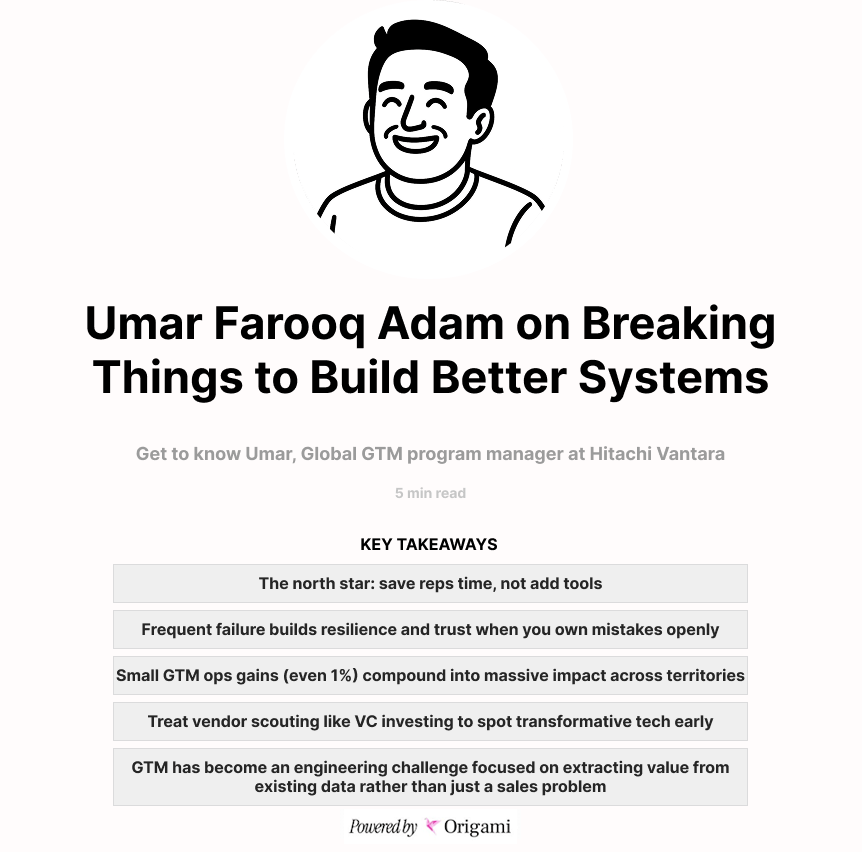
Umar is a global GTM program manager at Hitachi Vantara, where he's modernizing how a 114-year-old enterprise approaches go-to-market strategy. With an unconventional path through Microsoft's ecosystem and a track record of turning failures into strategic advantages, he's pioneering the concept of GTM engineering.
Umar sat down with Eric of Origami to discuss why modern sales is an engineering problem, the value of productive failure, and how curiosity can open more doors than credentials.
On curiosity opening unexpected doors.
Umar never applied for a single job in his career. Every opportunity came from challenging executives during casual conversations, from arguing with a CTO about product features to questioning why SDRs should make 100 cold calls daily. His pattern? Deep curiosity about everything from laundromat electricity monitoring to hairdresser appointment scheduling.
While working at Microsoft, he consulted 4,000 Australian SMBs in two years, learning industries he didn't know existed. This relentless curiosity meant when GPT-3 emerged (after he'd played pre- official launch), he was ready. The lesson: stop asking permission, start asking better questions.
On the incredible value of failing a lot.
"I've failed so much that it stops scaring you," Umar reflects. Rather than hiding the failure, he went straight to executives explaining exactly how it failed and what they could fix. The result? More trust, not disappointment.
He runs pilots not to see if they'll work, but to discover how else they'll go wrong. This approach revealed integration gaps and licensing issues that assumptions would have missed. His leadership now encourages him to "break a few things" because owning failures builds character and helps long-term, especially when you're experimenting outside office hours without risking your primary job.
On saving reps time as the north star.
"My only mission is: how do I save time for my reps?" “My only mission is: how do I save time for my reps?”
As his team covers Hitachi’s 100+ countries, Umar refuses to give reps new tools. Instead, he consolidates all GTM systems into a single sales engagement platform where everything appears:
Firmographics
Competitive analysis
Talk tracks
Contact information
Reps shouldn’t need to:
Research accounts
Find phone numbers
Log CRM activities
They should press one button and start talking. All intelligence from various tools writes back to that single platform with actionable next steps. The philosophy: use AI and automation on the backend to eliminate mundane tasks — not to add another login to remember.
On treating vendor exploration like a VC scout.
Umar spends weekends scrolling Product Hunt instead of Facebook. He visits every Y Combinator batch company’s website, adds all founders on LinkedIn, and follows their teams religiously. This isn’t casual browsing, it’s strategic scouting.
Like a venture investor, he evaluates tools based on the team’s ability to improve, not just their current features. Being early to GPT-3, Clay, and other tools wasn’t luck; it was systematic exploration.
His three go-to sources for discovering emerging tools:
Kickstarter — early-stage tech trends
Y Combinator — startup innovation
Product Hunt — daily launches
RevOps leaders, he argues, should bet on teams, not just products.
On GTM becoming an engineering challenge.
Modern GTM isn't about sales tactics; it's about data engineering. Enterprises have more data than ever (first-party, second-party, third-party) but struggle to use it effectively. The challenge isn't pricing or packaging; it's extracting value from existing data.
What worked 12 months ago (monitoring job changes, tracking signals) is now table stakes. Everyone's doing it. Success requires constant experimentation with new approaches: scraping data, AI automation, intent analysis. Hitachi, a data-first company serving automotive and healthcare, exemplifies this shift. GTM engineering means treating data architecture as seriously as sales methodology.
On the multiplier effect of GTM operations.
While sales reps help territories and customer success managers help specific accounts, GTM operations creates exponential impact. A 1% improvement across 100 territories compounds dramatically. This multiplier effect is why Umar chose operations over other path.
On constant experimentation as survival.
"If you find a successful campaign, others will copy it and results will slow down." Signals were revolutionary 12 months ago. Now everyone monitors them. Job change tracking was innovative. Now it's standard.
The solution? Run experiments constantly, not to confirm they'll work, but to discover failure modes. Whether it's scraping data, testing AI automation, or analyzing intent differently, you must stay ahead of the commoditization curve. Don't wait for global rollouts. Experiment in your own territory first, break systems to expose loopholes, then show leadership what needs fixing. In the short term, you're a troublemaker. Long-term, you're invaluable.
That’s it for this week!
Thanks for wanting to know more today than you did yesterday! If you liked this edition, forward it to your a friend who would like it too 🤝
Find more Modern GTM interviews here.
Learn how Origami helps sales teams here.
‘Til next time!
